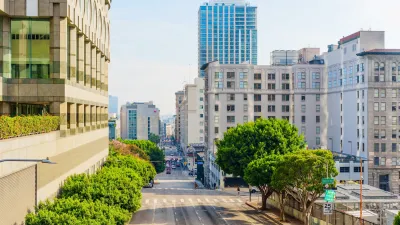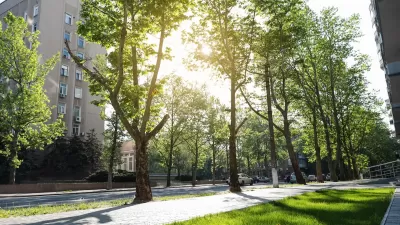The County of Los Angeles Chief Sustainability Office is leading the effort to prepare the county's first Urban Forest Management Plan.

Made up of trees on both public and private lands, the urban forest is an essential part of a healthy, thriving, and resilient community. When spread equitably and supported by other urban greening measures, a well-managed urban forest throughout Los Angeles County can deliver a wide range of benefits, such as healthier soils, biodiversity, habitats, shading from heat, and greater community health and well-being.
The County of Los Angeles Chief Sustainability Office (CSO) is leading the effort to develop an Urban Forest Management Plan (UFMP) which is a blueprint that will guide the planting of new trees and the protection of mature trees throughout the region. OurCounty, L.A. County's Sustainability Plan, calls for the development of the UFMP to ensure a climate-appropriate, healthy urban tree canopy that is equitably distributed. A key goal for the UFMP is to address inequities in the distribution of trees and tree canopy as well as the benefits they offer. Research shows that lower-income neighborhoods and communities of color often have less tree canopy.
In this article, CSO policy analyst Rebecca Ferdman addresses the following important questions and more:
- Compared to most major urban areas, does L.A. have a relatively healthy urban forest?
- Why are trees so important? Both from an ecological point of view and a quality of life point of view?
- What role do trees play in climate change? How can they help us adapt to rising temperatures, wildfires and the like?
- What can we do to make sure that all residents benefit from vibrant tree canopies?
- What kind of trees should we be planting in our communities?
- Is the iconic palm tree maybe a thing of the past?
- What is driving the County's UFMP and what do you hope to achieve?
To learn more, please read the source article.
FULL STORY: Putting Down Roots

Maui's Vacation Rental Debate Turns Ugly
Verbal attacks, misinformation campaigns and fistfights plague a high-stakes debate to convert thousands of vacation rentals into long-term housing.

Planetizen Federal Action Tracker
A weekly monitor of how Trump’s orders and actions are impacting planners and planning in America.

San Francisco Suspends Traffic Calming Amidst Record Deaths
Citing “a challenging fiscal landscape,” the city will cease the program on the heels of 42 traffic deaths, including 24 pedestrians.

Adaptive Reuse Will Create Housing in a Suburban Texas Strip Mall
A developer is reimagining a strip mall property as a mixed-use complex with housing and retail.

Study: Anti-Homelessness Laws Don’t Work
Research shows that punitive measures that criminalized unhoused people don’t help reduce homelessness.

In U.S., Urban Gondolas Face Uphill Battle
Cities in Latin America and Europe have embraced aerial transitways — AKA gondolas — as sustainable, convenient urban transport, especially in tricky geographies. American cities have yet to catch up.
Urban Design for Planners 1: Software Tools
This six-course series explores essential urban design concepts using open source software and equips planners with the tools they need to participate fully in the urban design process.
Planning for Universal Design
Learn the tools for implementing Universal Design in planning regulations.
Heyer Gruel & Associates PA
JM Goldson LLC
Custer County Colorado
City of Camden Redevelopment Agency
City of Astoria
Transportation Research & Education Center (TREC) at Portland State University
Jefferson Parish Government
Camden Redevelopment Agency
City of Claremont





























